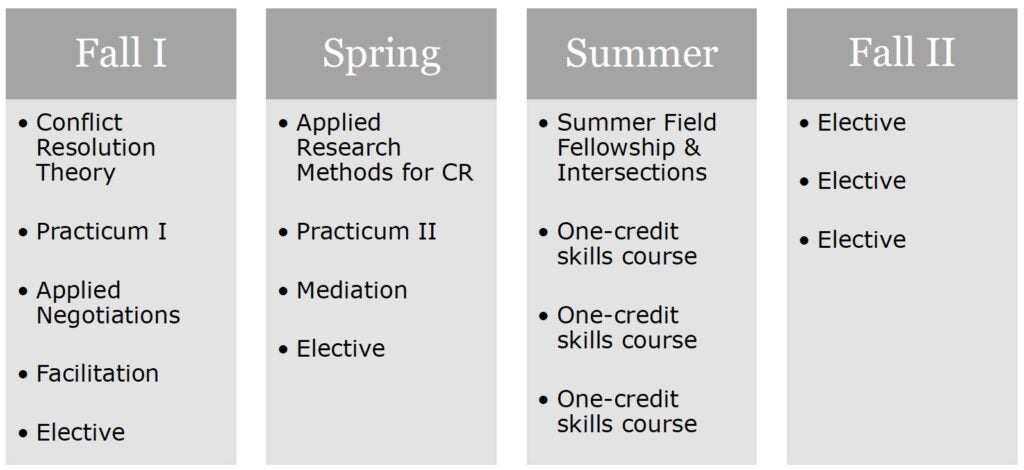Curriculum & Degree Requirements
We provide world-class training in the theory and practice of conflict resolution & peace studies.
Georgetown’s M.A. in Conflict Resolution is a peace and conflict studies program that draws its strength from scholars and practitioner faculty housed in the Department of Government. The degree consists of 34 credit-hours of required coursework. Full-time students can complete these requirements with four consecutive semesters of classes, including a summer of fieldwork. We operate the program in person on Georgetown’s main campus in Washington D.C.
Degree Progression for CR Students:

Three pillars of the Conflict Resolution curriculum:
Academic Core: Theory and Methods
Core courses, such as Conflict Resolution Theory and Research Methods, ground the curriculum. Courses in this portion of the curriculum provide students foundational instruction on conflict literacy, conflict analysis, violent conflict, conflict management, conflict prevention, conflict resolution, conflict transformation, peacemaking, peacekeeping, peacebuilding, social movements and nonviolence, and much more. In addition to the core courses, CR students also take five 3-credit MA-level electives.
Skills Training: Dialogue Skills and More
Students required to complete skills training in negotiation, mediation, and facilitation. Three additional 1-credit skills workshops are required in this category. Students have the option to earn certification in mediation through the available skills workshops.
Experiential Learning
Students follow a three semester sequence of experiential learning courses, consisting of Practicum I & II and the Summer Field Fellowship. Students engage in their chosen area of interest in the field, build professional networks and benefit from a guided, collective learning experience in the process.
The Practicum (fall and spring semesters) is the M.A. program’s capstone sequence. The Summer Field Fellowship is a program-supported, 6 to 10-week, full-time professional placement, undertaken (almost) anywhere in the world.
Additional Curricular Elements
Foreign Language Proficiency Requirement
All students in the program must demonstrate that they have completed substantial foreign language training prior to completing the program. Students may take language classes at Georgetown to meet the requirement and qualify for tuition assistance from the Joint Office of Graduate Studies for courses in the introductory and intermediate range.
Thesis Option
Students may opt to write a master’s thesis, which is carried out in a three-semester sequence. The thesis begins in the spring semester with a workshop on research design. Thesis writers collect data over the summer semester and write their thesis in their final fall semester. Thesis writers register for a 3-credit thesis workshop in their final semester as an elective.
Optional Certificates
CR students may also earn an area-studies or thematic certificate offered to Georgetown graduate students. Examples of these include:
- African Studies
- Arab Studies
- Asian Studies
- Eurasian, Russian and East European and Eurasian Studies
- Latin American Studies
- Diplomatic Studies
- Disability Studies
- Gender, Peace & Security – see promotional video
- Global Human Development
- Refugees, Migration, and Humanitarian Emergencies
- Social Innovation and Global Development
The coursework for these certificates also count toward a student’s progress in the CR Program; however, students are responsible liaising with the external certificate administrators to track their progress on certificate requirements.